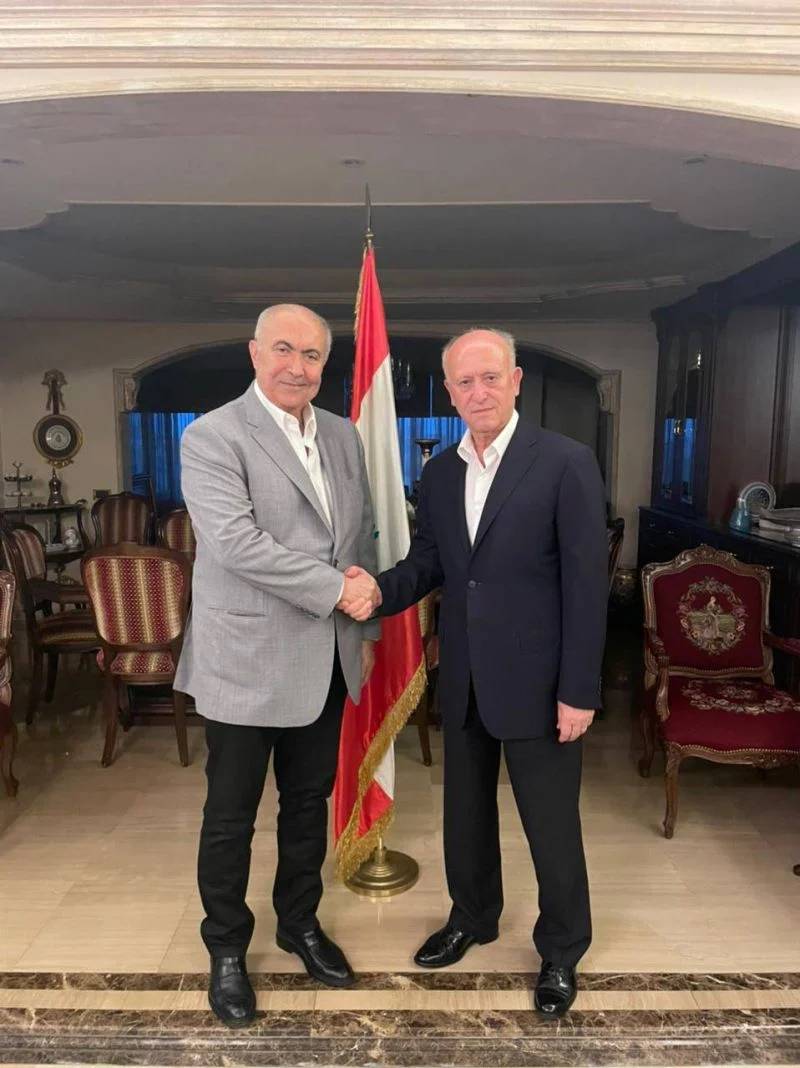
MPs Fouad Makhzoumi, left, and Ashraf Rifi, right, during a meeting earlier this week in Tripoli to study the formation of a parliamentary bloc. (Photo: Makhzoumi’s Twitter page)
Almost all the 27 Sunni MPs in Parliament are independents, which is the only thing they have in common.
There is a world of difference separating MPs who support a harsh rhetoric toward Hezbollah and those sympathetic to Amal and Hezbollah, including former Haririst MPs, protest movement MPs and “gray zone” MPs.
It is by capitalizing on this disunity that the ruling power camp has managed, despite a narrow lead, to impose its candidates in Parliament’s various internal elections.
As next Thursday’s binding parliamentary consultations to designate a new prime minister approach, all eyes are now riveted to the Sunni MPs.
The post of premier, reserved for a member of this community by tradition and not by law, has long been in the hands of figures close to Future Movement head Saad Hariri, who decided to bow out of politics in February.
Will Sunni MPs have their own bloc?
Faced with this reality, efforts are underway to “restore order within the Sunni house,” especially among opponents of Hezbollah and its allies.
Thus, Fouad Makhzoumi, a Sunni MP from Beirut, and his colleague from Tripoli Ashraf Rifi met a few days ago at Rifi’s residence to form “the core” of a “sovereigntist” parliamentary bloc.
Contacted by L’Orient-Le Jour, Rifi said that it will be difficult to give birth to such a bloc before the parliamentary consultations on Thursday.
“Our goal goes beyond this deadline, and we think it will be difficult to see a real change during the current presidential term. However, negotiations are underway with our partners,” the former head of the Internal Security Forces added.
The Tripoli MP also said that the bloc in preparation will transcend confessional issues.
“We need to put the community’s ranks in order to avoid another blow to the sovereigntist majority in the last few sessions of Parliament. The bloc we are preparing will not be exclusively Sunni, although the majority of its members will probably be,” Rifi added.
L’Orient-Le Jour also contacted sources close to Michel Moawad, an independent MP for Zgharta, who said that it was still too early to decide whether or not to join this bloc, despite the fact that Moawad has repeatedly declared that he was open to dialogue and cooperation with all “reformist sovereigntists.”
Who else could join this bloc?
While Rifi refrained from naming names, Rifi and Makhzoumi are likely setting their sights on figures close to Hariri.
Ahmad Kheir MP for Minieh, who said he has not been contacted by Rifi or Makhzoumi so far, does not seem very enthusiastic.
“We can’t force a political bloc to be born,” Khair said. “It emerges naturally with practice.”
Kheir also mentioned the informal cooperation among some independent MPs. A group of nine MPs, formerly part of Hariri bloc, has been meeting regularly to coordinate their positions.
“These meetings bring together Sunni parliamentarians following in the footsteps of Saad Hariri. They are joined by Sajih Attieh (Greek Orthodox) and Ahmad Rostom (Alawite),” Kheir said.
The group also includes figures like Abdel Karim Kabbara (Tripoli), Walid Baarini (Akkar) and Nabil Bader (Beirut).
According to Rifi, Hariri’s cousin Ahmad and his aunt Bahia have considerable influence on this group, which the Future Movement denies.
According to well-informed sources, though, Bahia Hariri was behind some sort of a barter during first session of Parliament, when she requested MPs close to her to vote for Nabih Berri (who won by just 65 votes) and Elias Bou Saab for the speaker and deputy speaker positions, in exchange for assurances that Abdel Karim Kabbara be given a seat in Parliament’s bureau, which is usually reserved to Sunnis.
Saudi efforts
For his part, former Prime Minister Fouad Siniora is leading his own initiative to unite Sunni MPs ahead of parliamentary consultations.
According to information obtained by L’Orient-Le Jour, negotiations are taking place between Siniora and the Saudi ambassador to Lebanon, Walid Bukhari, in order to draw up a political roadmap for the upcoming elections, or even to build a Sunni parliamentary opposition bloc aligned with Riyadh.
The kingdom wants to regain its influence on the Lebanese scene during the post-electoral period, having not completely succeeded in its gamble during the May legislative elections.
Although the Lebanese Forces had impressive electoral successes, Siniora, Riyadh’s Sunni protégé, only managed to have one MP elected, Bilal Hechaimi, in Zahle.
In Beirut and Saida, Siniora reportedly ran against lists implicitly supported by the Future Movement, which takes a dim view of the former premier’s attempts to build an “alternative leadership” in the Sunni street.
This story was originally published in French in L'Orient-Le Jour, translated by Sahar Ghousoub